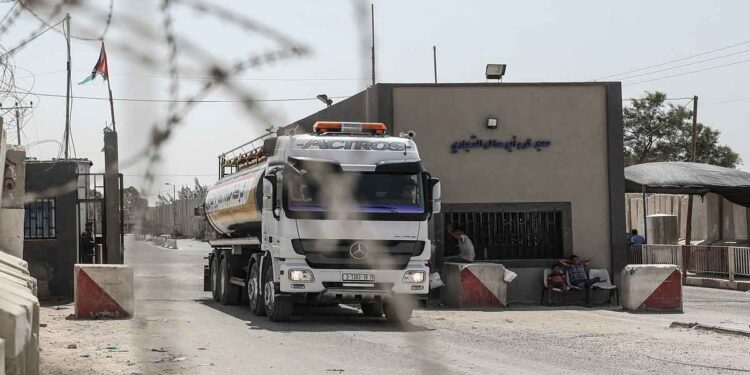Israel has blocked the entry of fuel trucks into Gaza, preventing them from supplying the only power plant in the territory.
Occupation authorities prevented 25 trucks from entering through the Kerem Shalom crossing – the primary commercial route into Gaza – on Sunday, 25 July.
Israel gave no reason for its action.
Palestinians in Gaza are already facing regular electricity outages as the power station is perpetually under-fuelled. This means that those living in Gaza can often only rely on five to six hours of power every day, and rarely more than 12.
The lack of power impacts the treatment of water, leading to a crisis in the availability of clean drinking water. Hundreds of thousands of the two million inhabitants of Gaza live without regular access to safe water as a result.
Israel frequently withholds fuel from Gaza, as one of its many means of controlling the area and enforcing its collective punishment on the civilians living there. It was only a month ago that fuel imports were allowed to restart, following 49 days of fuel being blocked entry after Israel’s 11-day military onslaught on Gaza.
Reconstruction, medical treatment, and other vital services were restricted as a result of Israel’s actions against a population attempting to rebuild after repeated air raids.
While there are also electricity lines coming into Gaza from Israel, they are often compromised, and even when working at full capacity do not provide the level of power needed.
During the recent Israeli bombardment, six of the main power lines from Israel were damaged or otherwise cut off, reducing the total power entering Gaza to 75mw (Gaza is estimated to need 400mw). Gaza is currently estimated to exist on just 96mw.
It is thought that the ongoing damage caused to its power network means that it would cost up to $8m to repair – but to do so would also require maintenance crews to operate at the Gaza-Israel border, a closed military zone.
Gaza has been under Israeli and Egyptian blockade for the past 15 years – meaning that all vital supplies, including fuel, medicine, food, and construction materials – are controlled by the Israeli occupation forces. As a result of the blockade, 80 percent of people in Gaza are now reliant on international aid.






























